The Driest Place on Earth
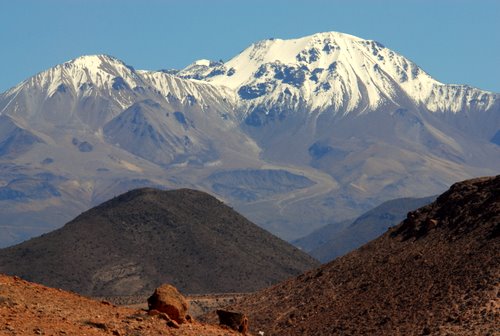
Three months ago if you had asked me to name the driest place on Earth I would have said (guessed!) the Sahara, the Gobi or perhaps even Antarctica… and there is no doubt that it would have taken many guesses for me to even start listing places in South America.
But alas, when I stepped off the ship this morning in Arica, Chile I was stepping onto part of the Atacama Desert… some sections of which have not received a single drop of rain in over one hundred years! In fact some weather stations in the Atacama have never received any rain at all!
I should probably fill in a few pieces of my journey. After leaving my amazing hosts in Pucallpa, Peru I flew back to the coast (to Lima) where I met up with a friend and boarded a ship heading down the coast of Chile. I was invited to be a lecturer on a ship (the Holland America, Prinsendam) which is in the process of doing a circumnavigation of South America (along with visits to Antarctica and the Falkland Islands). The lectures I am delivering have a natural history focus (birds, marine mammals, etc) as well as an overview of my Catt-Trax journeys (both my African trip from 5 years ago as well as the present one). Holland America has been very supportive of the Catt-Trax 2 journey and I have to thank both David and Holly in Seattle, as well as Peter on the Prinsendam. Muchas gracias! I know the ship (the Prinsendam) fairly well as I have lectured on similar natural history topics on her on other journeys on the Pacific & Arctic Oceans and the Caribbean Sea (I am a believer in the old adage, the best way to learn something is to have to teach it … and lecturing in different regions of the world has broadened my ecological knowledge and natural history background immensely).
Arica, Chile was the first port of call on the sector from Lima to Punta Arenas. Last fall a team of BCIT FWR students gave a seminar on Chile and how British Columbia compares in terms of natural history, wildlife, fish, and park values as well as conservation issues. There research is now on this website and you can read more about Chile by checking out: http://blogs.bcit.ca/catttrax2/south_america/chile
My goal for the day was to visit Lauca National Park high on a plateau near the border with Bolivia. Lauca National Park is a Biosphere Reserve and an amazing region of Chile. Within the park boundaries is Lake Chungara, which at over 4500 metres (14,900 feet) is one of the highest lakes in the world.
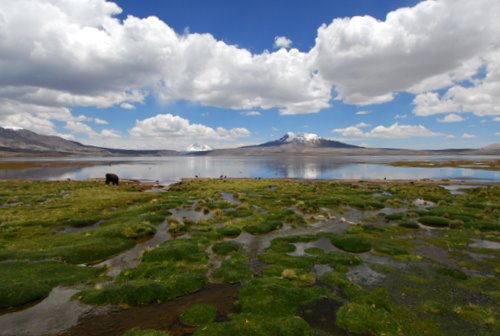
The long journey to the park gave me an opportunity to take in the amazing landscape. The Payachatas Volcanoes are the backdrop to Chungara Lake and along the lakes’ shores we saw vicunas and guanacos (both are wild relatives of the llama and the alpaca that I saw a lot of in Peru).
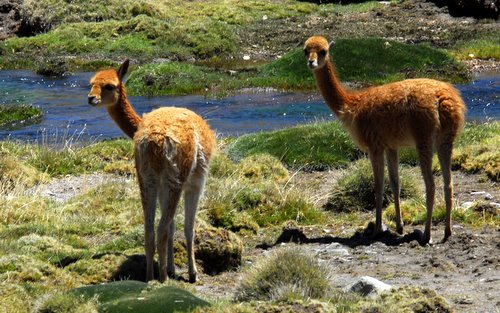
We climbed from sea level to almost 15,000 feet in just a few short hours. My body felt the change and I began to feel weak, I had no appetite and in fact began to feel nauseous – all signs of altitude sickness. Thankfully we were not at high altitude for too long and once we began to weave our way down in elevation I started feeling better right away. By the time we got back to sea level all was well.
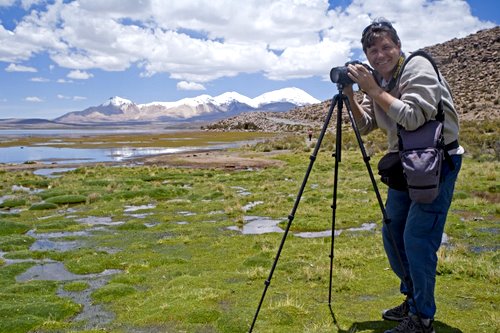
Thanks for the great information... and I hope some of the folks clicking in on the site took the time to click on the links you gave... that is wonderful. On the northern coast of Chile there are apparently healthy numbers of both Olive Ridley and Green sea turtles! I was amazed to see them in large numbers right along the shore of a big city. And... they seemed to be enjoying the pieces of fish that being eaten by the sea lions and the gulls... a very interesting afternoon! Hope you are well... and glad you had a great trip to Cuba!
Cheers
Danny
Lake Chungara photo-- Danny, what lens are you using on your camera there?
Do you have formal photographic training, or are you self-taught?
I love your use of diagonal lines in your photos. I'm learning so much just looking at your composition style! Thanks for the inspiration!
Jo McFetridge
Hey Danny,
As always your pictures are spectacular. Just caught up with you on the website. I'm really enjoying your journey.
Be safe.
Tess
I am really pleased that you were able to connect. I am well... en route to Antarctica tomorrow! Thanks for saying hello Tess and I look forward to hearing from you again soon.
Cheers, Danny
I am so pleased to hear from you. My adventure in Antarctica was fabulous ... and Steve, you would have needed more storage cards for sure with all of the photographic opportunities! I hope you made it home safely and do keep in touch. Thanks also for the invite, you may see me in the UK in the not too distant future. I will add some more pictures and post soon!
Cheers, Danny
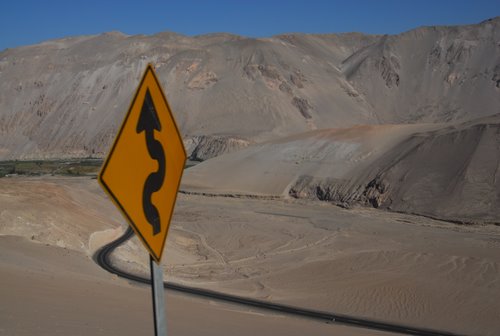
 Funded by TEK
Funded by TEK
Hi D,
Great to see your adventure just keeps unfolding with unique experiences. I've just returned from Cuba...a musical dream. Cuba offers impressive amounts of artistic and musical talents with a twist of uncertainty being a communist country.
I think an event worth mentioning is the blooming of flowers, which is an extremely rare occasion. As explained to me by a professor from Spain, a blooming event only occurs after a rare rainfall, perhaps every 7 years. These flowers basically remain dormant for most of their life. Here's a link to some of the flowers that will pop up after a rainfall: http://www.huedepohl.com/Atacama/Atacama30.htm
And another interesting aritcle on lizards predating on Atacama desert flowers: http://www.copiapoa.info/online/Aloe/lizard.htm
I was wondering when those sea turtles would turn up! Glad they came to say hello. What species did you see? Did you see any on the Amazon R.? Roald and his girlfriend were telling me about them hatching on the riverbanks.
Buenas suerte, Jean
PS I hope the gentleman that was ill on the boat made it to shore on time.